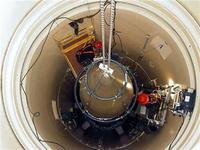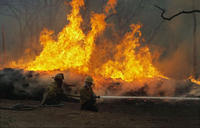-
Gaza-based Palestinian hackers compromise Israeli defense ministry computer
Hackers broke into a computer at the Israeli Ministry of Defense through an e-mail attachment tainted with malicious software. The attachment looked as if it had been sent by the country’s internal security service, the Shin Bet. it was likely that Palestinians were behind the cyberattack, saying that the more recent attacks were similar to cyberattacks against Israeli computers more than a year ago. Those attacks originated in the Hamas-controlled Gaza Strip. The attackers used an e-mail attachment to infect the computers with Xtreme RAT malware, which is a remote access Trojan. The malware allows hackers complete control of an infected machine. They can steal information, load additional malicious software onto the network, or use the invaded computer as a base of operations from which to conduct reconnaissance and attempt to gain deeper access into the network.
-
-
U.S. weapons shipped to moderate Syrian rebels after secret congressional approval
U.S. and European sources have confirmed that U.S.-manufactured light arm have been flowing to moderate Syrian rebels in the south of Syria, and that Congress has approved funding to continue the shipments for the next few months. The weapons, which are being delivered to the rebels through Jordan, include both light arms and heavier weapons such as anti-tank rockets. The shipments, however, do not include shoulder-fired anti-aircraft missiles.
-
-
Israeli jets destroy Hezbollah-bound advanced Russian missiles stored near Latakia
Large warehouses near the port city of Latakia, where the Assad regime stored advanced Russian missiles before shipping them to Hezbollah, were destroyed by aerial attack late Sunday. Israel has already launched six attacks in 2013 on Syrian arms shipments to Hezbollah — on 30 January, 3 May, 5 May, 5 July, 18 October, and 30 October. The attack on 5 July was on storage facilities in the same Latakia area, where Syria kept a large quantity of advanced P-800 Oniks anti-ship missiles, also called Yakhont missiles. Three weeks after the attack, U.S. sources said that the attack did not succeed in wiping out all of the missiles. “American officials said that further Israeli strikes are likely,” the New York Times reported on 31 July.
-
-
Minnesota wants to limit law-enforcement use of wireless tracking devices
The Minnesota Department of Public Safety’s acquisition of Kingfish and Stingray II wireless surveillance devices has come under scrutiny as the department’s Bureau of Criminal Apprehension(BCA) has used the devices in investigations. Some legislators are considering placing limits on law enforcement’s use of the data captured by the devices because of concerns over who has access to the data and how long it is being kept.
-
-
Expert calls for “surveillance minimization” to restore public trust
Surveillance minimization — where surveillance is the exception, not the rule — could help rebuild public trust following revelations about the collection of personal data, according to an expert on privacy and surveillance. “Surveillance minimization requires surveillance to be targeted rather than universal, controlled and warranted at the point of data gathering rather than of data access, and performed for the minimum necessary time on the minimum necessary people,” he says.
-
-
USAF nuclear-missile officers alleged to have regularly cheated on readiness tests

Three former U.S. Air Force officers have alleged that USAF officers responsible for operating nuclear-armed missiles at Malmstrom Air Base in Montana have, for many years, been cheating on monthly readiness tests, and were never punished for it. The former officers claim that cheating is the norm and that officers who did otherwise are the exception.The officers who made the allegations added, though, that misconduct on tests did not impair the safety of the nuclear weapons or the Air Force’s ability to launch missiles if ordered.
-
-
Last meals on death row may indicate guilt or innocence
Can last meals reveal more about individuals on death row than their taste preference? A new study examined whether an individual who has accepted guilt — by apologizing or confessing — is more likely to indulge in a last meal. The study found that those who denied guilt were 2.7 times more likely to decline a last meal than those who admitted guilt. Furthermore, those who were admittedly guilty requested 34 percent more calories of food and were more likely to request brand name, comfort-food items.
-
-
The basis for a permanent deal: deep, verifiable changes to Iran’s nuclear program
A new study says that only broad and verifiable changes to Iran’s current nuclear program could serve as a basis for a permanent nuclear deal between Iran and the international community. Among the changes: reducing the number of Iran’s uranium-enrichment centrifuges from the current 19,500 to no more than 4,000, and limiting Iran to one enrichment site; converting the heavy-water reactor being built in Araq to a light-water reactor fueled by low-enriched uranium; and imposing a tight, intrusive inspection regime for at least twenty years.
-
-
CBP flew its drones on behalf of other agencies
The U.S. Customs and Border Protection(CBP) operates the largest drone fleet in the United States. The Defense Departmenthas a much larger fleet, but it is prohibited from operating its drones in the United States for law enforcement missions. The FAA is working on opening U.S. skies for public and commercial drone traffic, but for now CBP is the only agency permitted to operate drones on a daily basis within the nation’s borders. Released documents show that agencies not allowed to operate drones borrowed them from CBP.
-
-
Restrictive concealed weapons laws correlated with an increase in gun-related murders

It may make sense to assume that states in which there are tight laws on weapons would make that state a safer place and one with less gun crime, but recent research argues that the very opposite is true. Research shows that in states with more restrictive concealed carry weapons (CCW) laws there is actually an increase in gun related crime. The author notes that his study looks solely at gun crime, rather than violent crime, which is the case in similar research.
-
-
Turkeys inspire smartphone-capable early warning system for toxins
Some may think of turkeys as good for just lunch meat and holiday meals, but University of California, Berkeley bioengineers saw inspiration in the big birds for a new type of biosensor which changes color when exposed to chemical vapors. This feature makes the sensors valuable detectors of toxins or airborne pathogens. The technology can be adapted so that smartphones can help analyze the color fingerprint of the target chemical. In the future, it could potentially be used to create a breath test to detect cancer and other diseases.”
-
-
Judge denies defense request to see whether NSA surveillance led to terrorism charges
U.S. District Judge Sharon Johnson Coleman on Friday ruled that lawyers for Adel Daoud, a 20-year old resident of Hillside, a suburb west of Chicago, who was charged with plotting to set off a powerful bomb outside a crowded Chicago bar, will not be allowed to examine whether the investigators who initiated the sting operation which led to Doud’s arrest relied on information gleaned from NSA surveillance programs. Attorneys for Daoud had asked Judge Coleman to instruct prosecutors to disclose “any and all” surveillance information used in Daoud’s case, including information disclosed to a U.S. Senate’s Select Committee on Intelligence. In a brief ruling posted late Friday, Coleman denied the motion, writing that the defense had “failed to provide any basis for issuing such an order.” Prosecutors would not confirm whether the FBI had initiated its operation against Doud as a result of a tip from the NSA, but they did say that even if such surveillance did exist, they have no plans of using it at trial and the defense was not entitled to it.
-
-
House approves $447 for Cyber Command
The House of Representatives approved a fiscal 2014 stop-gap budget last Monday (it approved to full spending bill on Wednesday), which allocates $447 million to the Defense Department’s Cyber Command. This is more than twice the $191 million budget for Cyber Command in 2013.
-
-
Know when to go: a new way to keep firefighters safe from harm

For a firefighter, knowing when it’s time to evacuate can be the difference between life and death. But that can be a difficult call to make when you’re trying to protect life, property and resources while battling wildfires in arduous weather and terrain. Whether working at the fire’s edge or creating a fire break far from the front, firefighters must maintain situational awareness and monitor impending threats to their safety. When firefighters are unable to properly recognize risks, or they underestimate conditions, the results can be tragic.
-
-
Obama announces reforms of U.S. intelligence data collection practices
President Barack Obama on Friday called for a “new approach” by the U.S. intelligence community to the collection of Americans’ phone metadata. The major changes in current practices involve storage of and access to bulk metadata; the presence of a public advocate during FISA court deliberations; new privacy protections for non-Americans; and new restrictions on spying on leaders of allied countries. Obama offered a robust defense of the U.S. intelligence services, saying that there was no evidence they had abused their power, and that many of their methods were necessary to protect Americans. “We will not apologize simply because our services may be more effective,” he said. The president pointedly noted that some countries that “have loudly criticized the NSA privately acknowledge that America has special responsibilities as the world’s only superpower . . . and that they themselves have relied on the information we obtain to protect their own people.”
-
More headlines
The long view
Factories First: Winning the Drone War Before It Starts
Wars are won by factories before they are won on the battlefield,Martin C. Feldmann writes, noting that the United States lacks the manufacturing depth for the coming drone age. Rectifying this situation “will take far more than procurement tweaks,” Feldmann writes. “It demands a national-level, wartime-scale industrial mobilization.”
How Male Grievance Fuels Radicalization and Extremist Violence
Social extremism is evolving in reach and form. While traditional racial supremacy ideologies remain, contemporary movements are now often fueled by something more personal and emotionally resonant: male grievance.
The Surprising Reasons Floods and Other Disasters Are Deadlier at Night
It’s not just that it’s dark and people are asleep. Urban sprawl, confirmation bias, and other factors can play a role.
Why Flash Flood Warnings Will Continue to Go Unheeded
Experts say local education and community support are key to conveying risk.
